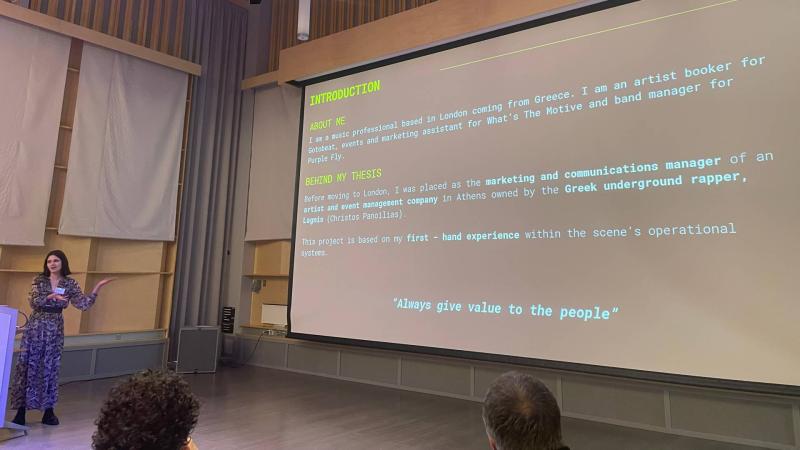Music Business Management MA students Eric Nsangu Tusevo and Zoi Eskitzopoulou presented their research at the 14th International Music Business Research Days (IMBRD) conference from 1-3 November 2023, hosted by the Popular Music Department of the University of Agder in Kristiansand, Norway, in collaboration with the International Music Business Research Association (IMBRA).

The IMBRD conference aims to provide a platform for interdisciplinary discussion that encompasses various areas such as economics, art, culture, society, law, technology, and other developments that contribute to the different aspects of music, including creation and production, dissemination and distribution, and reception and consumption. The inclusive and interdisciplinary nature of the forum welcomes scholars from diverse scientific fields, calling for a range of research methods.
Eric Nsangu Tusevo and Zoi Eskitzopoulou were invited to present their dissertations at the conference and were accompanied by Julia Toppin, Lecturer in Music Enterprise and Entrepreneurship at the University of Westminster. While at the conference, Toppin was also invited to join the editorial board of the International Journal of Music Business Research which she accepted.
Eric presented his dissertation which aimed to understand the perceptions of interpolations in consumers of popular music. Interpolations can be understood as the predecessor of the practice of sampling, which utilises existing bodies of work by copying, pasting, and oftentimes modifying snippets of recordings from pre-existing songs. Interpolations, on the other hand, reflect a pre-existing body of work through the note-for-note recreations of melodies, lyrics and cadences.
Eric argues that while interpolation and sampling are very similar in effect, since the early 2010s, there has been a considerable increase in songs which use interpolation on the Billboard Hot 100 charts. As such, his research investigated the phenomenon of interpolation and contextualised it in popular music while also exploring listeners' perceptions of interpolations. Ultimately, the results found that both the original and interpolated bodies of work through which the musical artifacts were expressed evoked a range of emotions in the listeners who grew up listening to either version. However, when the interpolated musical artifacts were presented as interpolations in the context of the pre-existing body of work, they were received better by the Gen Y cohort, who grew up with the original version, than the participants from the Gen Z cohort, who expressed a feeling of unoriginality.
Speaking about how it felt to present his dissertation at the conference, Eric said: “To be invited with Zoi as the only MA students to present our dissertations at the IMBRD conference on a day otherwise filled with PhD candidates was very exciting. I don't really consider myself an “academic” as such, so I wasn't sure what to expect. However, Julia and Zoi brought the vibes, and the research peeps and profs brought the entertainment with their intriguing albeit intricate research.”
Zoi’s research explored the unique managerial and marketing practices of the Greek underground rap scene that keep it sustainable away from governmental control and popular culture media. The qualitative research involved 22 interviews with upcoming as well as established underground rappers and industry professionals. The idea for the research stemmed from her personal experiences working as a marketing and communications manager for a music management company owned by an underground rapper.
Zoi found that the genre’s network operates instinctively and executes music business activities without extensive relevant education. Partnerships resemble friendships built on trustworthiness rather than professionalism. Releases and concerts rarely get advertised, while social media and friendship groups spread updates. Music broadcasters fail to reference the Greek underground rap scene as it contradicts the notion of popularity. Despite these atypical approaches, the music itself sees outstanding results, accumulating millions of streams and thousands of followers while selling out venues continuously.
Speaking about how it feels to have been able to present at the IMBRD conference, Zoi said: “It has been an incredible honour and a rewarding experience to be selected to present at the IMBRD conference. Alongside fellow researchers and highly esteemed academics we unveiled some of the complexities of the international music industry and displayed pathways of growth. As a Master’s postgraduate and an aspiring music professional, it has spread my horizons to a diversity of sectors and areas of interest.”
Find out more about Music courses at the University of Westminster.



